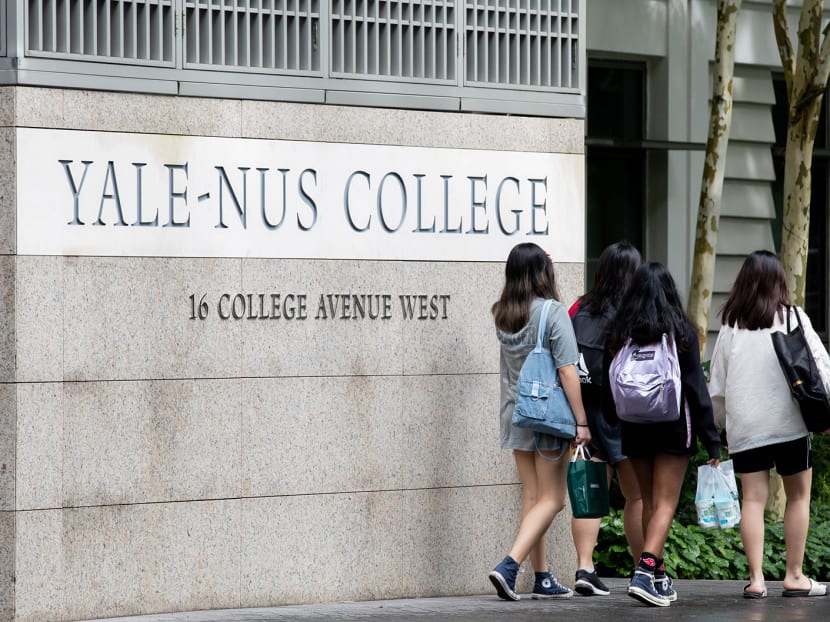Decision to merge Yale-NUS and scholars programme a ‘considered’ one endorsed by MOE, board of trustees: NUS
SINGAPORE — The National University of Singapore (NUS) has come out to reiterate that its decision to merge its University Scholars Programme (USP) with Yale-NUS College was a “considered” decision, and it had consulted the Ministry of Education (MOE) and the chairman of the university’s board of trustees two months before the announcement was made.
- On Aug 27, NUS made a surprise announcement to stop taking in students for Yale-NUS College
- MOE and the chairman of NUS' board of trustees were consulted two months before news was made public
- NUS is now engaging staff members, faculty and students of its University Scholars Programme and Yale-NUS to address their concerns and questions
- Yale-NUS said it will provide assistance and support for students who wish to transfer to NUS or another university
SINGAPORE — The National University of Singapore (NUS) has come out to reiterate that its decision to merge its University Scholars Programme (USP) with Yale-NUS College was a “considered” decision, and it had consulted the Ministry of Education (MOE) and the chairman of the university’s board of trustees two months before the announcement was made.
Both MOE and the NUS board of trustees chairman then supported the move, the university said in response to TODAY’s queries.
Last Friday, after the announcement of the merger, a memo was sent to students from Yale-NUS College’s elected body of student representatives, saying that they felt betrayed and were all surprised to hear about the decision that was “taken from a top-down, governing board level”.
NUS said in its latest statement that the decision to combine the two entities into a new college was done taking into consideration its “broader vision” and plans to “expand access to a liberal arts education”.
“The formation of the new college is part of NUS’ roadmap to deliver flexible, interdisciplinary education more accessibly, and at greater scale,” it added.
NUS also said that these plans kicked off with the formation of the College of Humanities and Sciences announced in December 2020, which the varsity had said was formed as a push for interdisciplinary learning. It admitted its first batch of students last month.
“Our vision is for the new college to sustain the best qualities of both (Yale-NUS and USP), including the unique culture, character and camaraderie of both communities, as well as their innovative educational experiences and distinctive curriculum.”
When Parliament next convenes on Sept 13, opposition parliamentarians are planning to debate the merger, with one of them, Dr Jamus Lim from the Workers’ Party, having already questioned if there will be overlap between the new college and the College of Humanities and Sciences.
NUS announced last week that this year’s cohort of students to enrol in Yale-NUS College will be its last, and both the college and USP will be combined to form a new college, which is not named for now.
This will end NUS’ 10-year tie-up with Yale University in the United States, which saw the establishment of the first liberal arts college in Singapore and one of the first in Asia.
Yale-NUS College will remain open and continue running its academic, co-curricular and research programmes until the end of academic year 2024/25.
Students now enrolled in the USP will move to the new college from academic year 2022/23, when it will welcome its first intake of up to 500 students.
Students from Yale-NUS College and NUS have started a petition to NUS and the authorities, asking for more transparency in the decision-making process and for the school to reverse its decision on the merger.
As of Friday night, the petition has gathered close to 13,200 signatures.
Yale University’s president Peter Salovey said last week that he learned of the merger in July from NUS president Tan Eng Chye, and that Yale “would have liked nothing better” than to continue the development of Yale-NUS.
WHAT HAPPENED BEFORE ANNOUNCEMENT
In its reply to TODAY, NUS provided a brief timeline of the developments leading up to the surprise announcement.
Late June 2021: NUS consults MOE as well as the NUS board of trustees chairman on the merger. Both parties supported and approved the proposal.
July 2021: In early July, NUS formally initiates discussions with Yale University on the planned merger. Yale University acknowledges NUS’ plans and notes that it is within NUS’ rights to do so under the original affiliation agreement. NUS informs the leadership of Yale-NUS of its decision in the same month.
July to early August 2021: The Yale-NUS executive committee discusses transition plans.
August 2021: The NUS board is briefed about the merger in early August. The Yale-NUS governing board endorses the transition plans in the same month.
Since it made the announcement, NUS said that it has been working closely with both Yale-NUS College and USP, engaging their staff members, faculty, students and alumni to address any concerns and questions.
“This continues to be our main priority,” it said.
It added that the new college planning committee will include faculty and student representatives from both Yale-NUS College and USP.
It is now developing plans for the new college and more details will be available in due course.
TODAY has reached out to MOE for comment.
SUPPORT FOR YALE-NUS STUDENTS
Professor Joanne Roberts, Yale-NUS’ executive vice-president of academic affairs, said in response to TODAY’s queries that its students are “strongly encouraged to remain in their studies" at the college.
“The college will continue until 2025 with a strong commitment to the same level of academic and residential programming that has always been characteristic of the Yale-NUS experience,” she said.
Still, Yale-NUS will provide assistance and support for students who wish to transfer to NUS or another university.
As for students who have confirmed a place at Yale-NUS college, but have opted for deferred matriculation, Prof Roberts said that these students will be offered automatic admission to the new college and the College of Humanities and Sciences without needing to go through another application process.
Yale-NUS will reach out to these students individually to explain the options available to them, she said.
For faculty members, Prof Roberts said that NUS will honour all existing employment contracts and no one will be made redundant.
“The priority of the Yale-NUS staff and faculty in the next four years will be educating Yale-NUS students.
“However, as the number of students declines, there will likely be opportunities to teach or support the new college students or to be deployed to work or teach at other NUS departments,” she added.
“These matters will be pursued in conversations with individual staff and faculty about their future.”
As cohorts graduate and student numbers drop, the campus will be shared with students from the new college.
Details on how facilities will be shared are being worked out by the Yale-NUS leadership, she said.
“Yale-NUS students can be assured that they will continue to have the amenities and student-to-staff ratios that they currently enjoy.”












